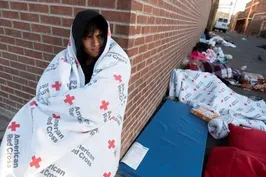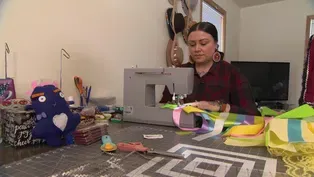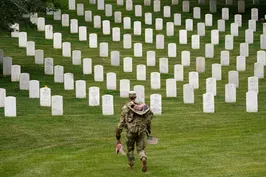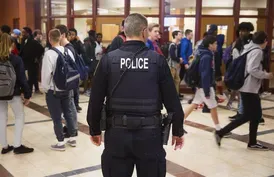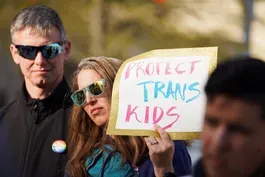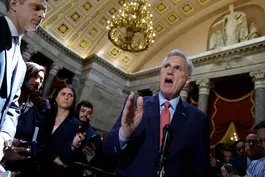
Erdogan wins runoff to secure grip on power in Turkey
Clip: 5/29/2023 | 11m 25sVideo has Closed Captions
Turkish President Erdogan wins runoff to secure his grip on power
Turkish President Recep Tayyip Erdogan won Sunday's run-off election, surviving the biggest challenge to his two decades in power. The victory cements his grip on Turkey, an important NATO member, despite mounting economic woes, skyrocketing inflation and poor response to February's devastating earthquake. Amna Nawaz discussed the impact of results with Gönül Tol and James Jeffery.
Problems with Closed Captions? Closed Captioning Feedback
Problems with Closed Captions? Closed Captioning Feedback
Major corporate funding for the PBS News Hour is provided by BDO, BNSF, Consumer Cellular, American Cruise Lines, and Raymond James. Funding for the PBS NewsHour Weekend is provided by...

Erdogan wins runoff to secure grip on power in Turkey
Clip: 5/29/2023 | 11m 25sVideo has Closed Captions
Turkish President Recep Tayyip Erdogan won Sunday's run-off election, surviving the biggest challenge to his two decades in power. The victory cements his grip on Turkey, an important NATO member, despite mounting economic woes, skyrocketing inflation and poor response to February's devastating earthquake. Amna Nawaz discussed the impact of results with Gönül Tol and James Jeffery.
Problems with Closed Captions? Closed Captioning Feedback
How to Watch PBS News Hour
PBS News Hour is available to stream on pbs.org and the free PBS App, available on iPhone, Apple TV, Android TV, Android smartphones, Amazon Fire TV, Amazon Fire Tablet, Roku, Samsung Smart TV, and Vizio.
Providing Support for PBS.org
Learn Moreabout PBS online sponsorshipTurkish President Recep Tayyip Erdogan won yesterday's run-off election, surviving the biggest challenge to his two decades in power.
The victory cements his grip on Turkey, an important NATO member, despite mounting economic woes, skyrocketing inflation, and poor response to February's devastating earthquake.
At his massive white palace on the edge of the capital city, Ankara, before a sea of supporters who say they would die for him, Turkey's undefeated ruler celebrated his victory.
RECEP TAYYIP ERDOGAN, Turkish President (through translator): We are not the only winners.
The winner is Turkey.
The winner is our nation with all its segments.
AMNA NAWAZ: But clearly not all.
Hours before, in Istanbul, he branded his opponent pro-LGBT and said there's no place for LGBT Turks in his party.
RECEP TAYYIP ERDOGAN (through translator): Can LGBT infiltrate the A.K.
Party?
Can they infiltrate the MHP?
Can they infiltrate into the other People's Alliance members?
AMNA NAWAZ: He was part of a chorus heralding another five years in power.
That, should he serve his full term, would make him Turkey's ruler for a quarter-century.
He first became prime minister in 2003, riding to power on anger against the secular political elite.
He was the alternative, a religious, working-class outsider who presented himself as a progressive ally of the West and helped lead the country to economic growth.
But, with time, Erdogan evolved into a political strongman dubbed as Turkey's new sultan.
He cracked down on dissent, arrested critics and journalists, and rules Turkey with an iron fist after centralizing power in the office of president in 2018, which reinforced his one-man rule.
This year, Erdogan faced a unified opposition led by Kemal Kilicdaroglu.
KEMAL KILICDAROGLU, Turkish Presidential Candidate (through translator): We experienced the most unfair election in recent years.
All the means of the state were mobilized for a political party.
All possibilities were laid under one man's feet.
AMNA NAWAZ: Kilicdaroglu accused Erdogan of using public schemes and mass media to tilt the tide in his favor and says Erdogan fought a divisive campaign that polarized Turkey.
HULYA YILDRIM, Turkish Resident (through translator): I look at the people around me who were supporting the opposition, and all of them are resentful.
ALTAY SAHIN, Turkish Resident (through translator): Thank God he was elected.
It's a good result, because Tayyip Erdogan Erdogan is a good leader.
He knows what the people want.
AMNA NAWAZ: The post-election map shows that Erdogan's alliance suffered losses in major urban centers, including Istanbul and Ankara, which contribute more than half of Turkey's GDP.
Erdogan's number one task ahead is to tackle inflation that's more than 40 percent, a collapsing Turkish currency, and the ongoing effects of the February earthquake that killed more than 50,000 Turks, all while steering the nation into what he says will be the Turkish century.
To discuss the impact and significance of President Erdogan's electoral win, we turn to Gonul Tol.
She's the author of "Erdogan's War: A Strongman's Struggle at Home and in Syria."
She's also the founding director of the Turkey Program at the Middle East Institute, a Washington, D.C.-based think tank.
And James Jeffrey spent 35 years as an American diplomat, including as U.S. ambassador to Turkey from 2008 to 2010.
He is now chair of the Middle East Program at the Wilson Center, which is also a D.C.-based think tank.
Welcome to you both.
So, Gonul, as you know, polling earlier this month had Erdogan trailing all of the prospective candidates.
He was facing massive inflation, frustration over the COVID response, over that earthquake response.
How did he win?
GONUL TOL, Founding Director, Middle East Institute Center for Turkish Studies: Well, by basically following the autocrat's playbook, Amna.
He stirred up the cultural war.
He polarized society and framed the elections as an existential war for survival.
And in such polarized context, usually, voters do not easily change their voting behavior.
They tend to forget about the pressing problems because they see that as an existential war.
And that's how he managed to prevent defections, and that's how he managed to keep his base together.
AMNA NAWAZ: Ambassador Jeffrey, you know Erdogan.
When you look at how he won, where he won, in particular, what strikes you?
JAMES JEFFREY, Former U.S.
Ambassador to Turkey: How consistent this has been over the past 20 years.
He wins in the heartland.
He doesn't win in the cosmopolitan coastal areas, and he has a hard time -- it varies, but he had a hard time this time in the Kurdish areas in the southeast, so no surprises there.
This is his base, and he played off of his base, as Gonul said.
AMNA NAWAZ: Ambassador Jeffrey, there is a unified opposition here, though.
Do you think he looks at this win as giving him a mandate of some kind?
JAMES JEFFREY: Absolutely.
He looks at this as a 4 percent victory over his challenger, Kemal Kilicdaroglu, although he realizes that he lost some 6 or 7 percent of his support from 2018.
But I think this is a clear enough victory for him -- and he didn't need much -- for him to think he has a mandate.
He thinks that he has 20 years of rule behind him and that this is giving him another five, which it, in fact, is.
AMNA NAWAZ: Gonul, when you look at the election, would you call it free and fair?
GONUL TOL: Certainly wasn't, Amna.
The elections were not fair leading up to in the days -- leading months leading up to the elections.
I think Erdogan tilted the playing field in his favor heavily.
He used vast state resources and the media under his control to reach out to the voters.
On the other hand, the opposition, its efforts to get his message across were hindered by state institutions, government authorities.
In state broadcaster, for instance, Erdogan got 32 hours of airtime, while his opponent, Kilicdaroglu, only got 32 minutes.
So, the elections were not fair.
But, usually, international observers call Turkey's elections unfair, but free.
And I think that's a huge problem.
We really need to think about -- rethink the way we think about Turkey's elections, because if the incumbent does everything in his power to tilt the playing field so much in his favor, I think the ballot box is already stuffed.
So the elections are not free either.
AMNA NAWAZ: Well, Gonul, what about the way the U.S. looks at Turkey in terms of a partnership?
Turkey is a NATO member.
It stood in the way of NATO expansion before.
Should the U.S. see Turkey as a reliable NATO member?
GONUL TOL: Well, I think the United States already resigned itself to the fact that Turkey is a problematic partner, but it is a NATO ally, and it's learned to live with it, live with disagreements.
So, from now on, I think we will see more of what we have seen in the last years, which is a transactional partnership, where the United States will not care that much about what Erdogan does to his own people, to his own institutions, what happens inside Turkey's borders.
But Washington will work, continue to work with Erdogan on the foreign policy front in places where the interests overlap.
AMNA NAWAZ: Ambassador Jeffrey, do you agree with that assessment?
JAMES JEFFREY: Basically, particularly on the transactional issue by issue, and, there, Washington has had some success.
I would disagree a bit.
I don't think this was a free and fair election, but it didn't cross over the border where Washington would have reacted.
If this had looked like the tearing up of democracy, if it looked like Erdogan didn't have something like a majority, this would have been a huge problem for Washington.
It realizes the problems that Gonul laid out, but they were not bad enough for Washington to react.
Under different circumstances -- and I think people were concerned about that -- this could have been a problem.
It isn't.
We will move forward dealing with the Erdogan we have.
AMNA NAWAZ: How does this complicate, though, Ambassador Jeffrey, the U.S.-Turkey relationship moving forward?
I mean, the fact that his win earned congratulatory messages from both President Biden and from Russian President Vladimir Putin, who called him a dear friend, what does all this mean for the alliance moving forward?
JAMES JEFFREY: Turkey, like Israel and like Iran, although they are closely partnered with the United States on many security issues, have to be careful about Russia.
Erdogan has Russian forces to his south in Syria, to his north in the Black Sea area, and northeast in the Caucasus.
He has a trade and energy relationship with Russia.
He will be careful.
He has also militarily acted against Russia multiple times since 2020 and, most importantly, is absolutely essential to what we're trying to do in Ukraine.
And that's one reason why President Zelenskyy also was one of the first to congratulate him.
It's a very complicated relationship, but, all in all, its beneficial to NATO and to us.
AMNA NAWAZ: Gonul, clearly, his biggest challenges will be domestic in the first few years, of course, this massive economic problems that he's facing.
Can he stave off an economic crisis?
GONUL TOL: Well, it depends on what he decides to do, Amna.
He will certainly be facing a more unstable domestic context.
And the top challenge that he will be facing is the country's economic problems.
And, in the past -- we are where we are, Turkish economy is where it is right now because of Erdogan's unorthodox economic policies.
So, moving forward, many economists expect that, if he stays on that course, Turkish -- Turkey's economic problems will grow.
But he will have a chance.
If he decides to put together a strong group of advisers who can tell him the right things on the economic front, if he can find market-friendly faces, and if also he will have to work with the European Western institutions as well, I think there is hope.
But he could take another route, which is, in the last few years, he relied on friendly autocrats, like Russia, like the Gulf countries.
Those countries injected cash into Turkish economy.
So if he takes that route, I think more trouble is ahead for Turkish economy.
AMNA NAWAZ: Ambassador Jeffrey, when you look into his next five years in office, how do you see it?
JAMES JEFFREY: First of all, as Gonul said, he has to get ahead of inflation.
The Turkish lira is now 20 to the dollar, roughly, and it may fall as much as 26 to 28 in the weeks ahead.
That's the most important thing.
He will maintain his transactional relationship.
There will be no major differences from what we have seen in the past.
What Brussels and Washington can do -- and I think we have seen with these congratulatory messages the first step -- is try to work out modus operandi with this guy to try to advance common interests.
And there are common interests.
But it's not going to be easy.
He's a difficult leader to deal with, as we have seen repeatedly.
AMNA NAWAZ: All right, Ambassador James Jeffrey and Gonul Tol, thank you both for joining us tonight.
JAMES JEFFREY: Thank you.
El Paso clinics struggle to care for influx of migrants
Video has Closed Captions
Clip: 5/29/2023 | 4m 7s | Inside the El Paso medical clinics struggling to care for influx of migrants (4m 7s)
Native American fashion aims to reclaim its culture
Video has Closed Captions
Clip: 5/29/2023 | 6m 13s | Native American fashion aims to reclaim its culture with authentic designs (6m 13s)
Remembering and honoring the nation’s fallen on Memorial Day
Video has Closed Captions
Clip: 5/29/2023 | 3m 24s | Remembering and honoring the nation’s fallen on Memorial Day (3m 24s)
Some schools reverse decision to remove officers from campus
Video has Closed Captions
Clip: 5/29/2023 | 5m 50s | School systems consider reversing decision to remove police officers from campus (5m 50s)
State-level battles brewing in America over LGBTQ+ rights
Video has Closed Captions
Clip: 5/29/2023 | 6m 7s | The state-level battles brewing in America over LGBTQ+ rights (6m 7s)
What's in debt agreement and potential effects on economy
Video has Closed Captions
Clip: 5/29/2023 | 11m 32s | What's in the debt limit agreement and its potential effects on the economy (11m 32s)
Providing Support for PBS.org
Learn Moreabout PBS online sponsorshipSupport for PBS provided by:
Major corporate funding for the PBS News Hour is provided by BDO, BNSF, Consumer Cellular, American Cruise Lines, and Raymond James. Funding for the PBS NewsHour Weekend is provided by...
